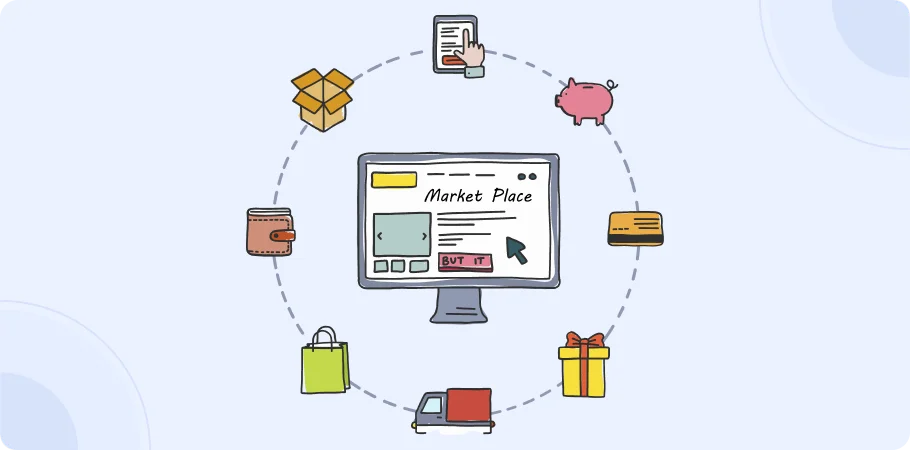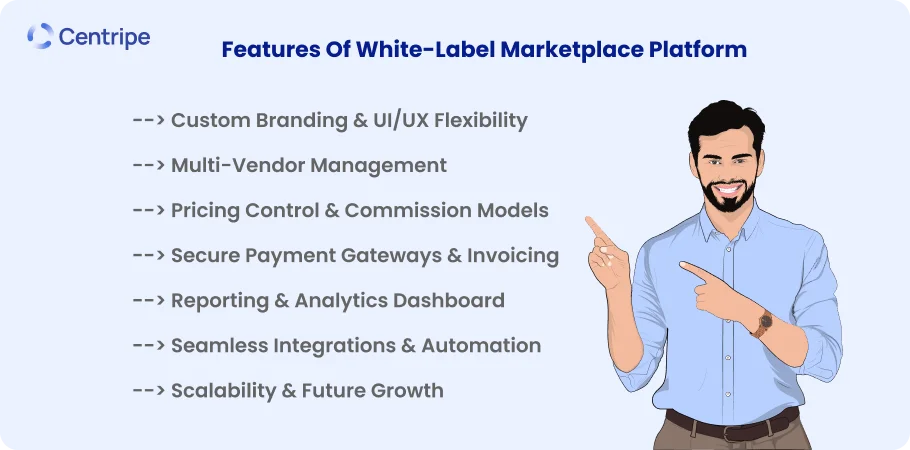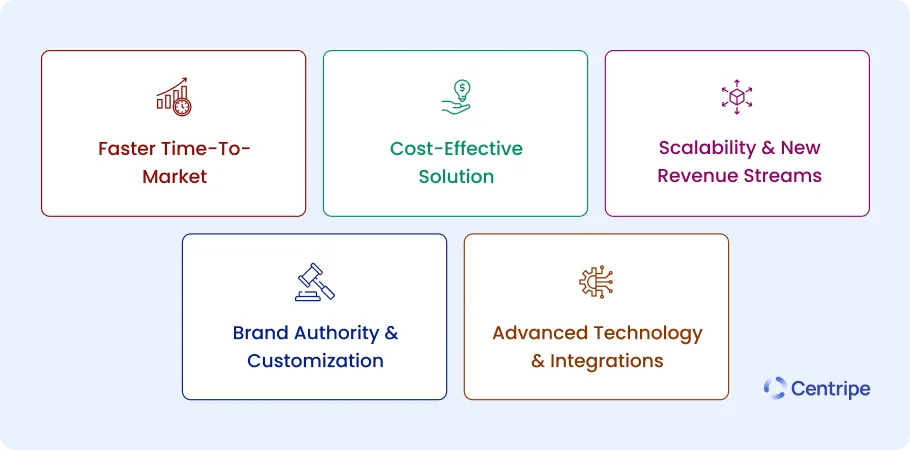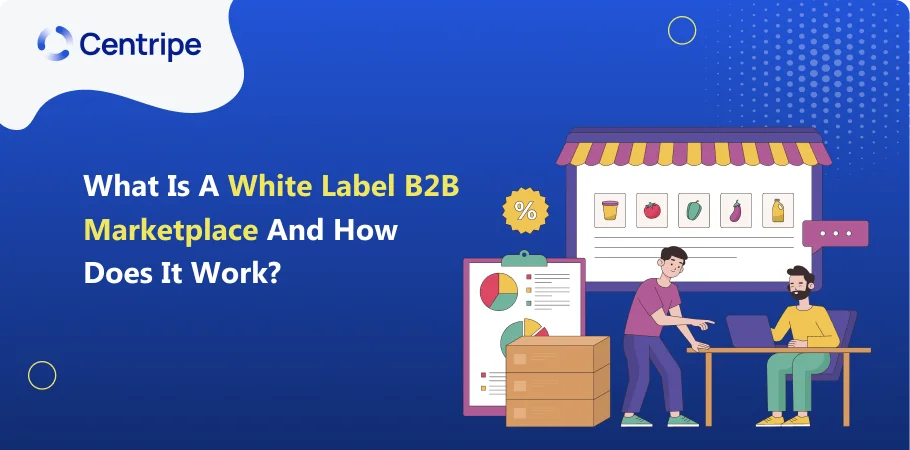Imagine when you have a great idea for an online marketplace. But building it from scratch feels overwhelming. Finding developers, setting up the technology, and making sure everything runs smoothly takes time and money. This is where White Label b2b marketplace comes in picture.
What if you could skip all that and focus on growing your brand instead?
That’s where white label marketplace software comes in. Instead of spending months developing a platform, you get a ready-to-use white-label marketplace platform. You can customize it, add your branding, onboard vendors, and start selling. That too, without the hassle of building it yourself.
More businesses are choosing this option. Whether you’re a wholesaler, distributor, or service provider, a white-label marketplace helps you launch faster, reduce costs, and scale your business. No tech struggles, just growth.
Let’s explore how a white-label marketplace works and why it’s changing the way businesses operate.
What Is a White Label B2B Marketplace?
A white label B2B marketplace is a ready-made marketplace platform that businesses can brand and customize as their own. Instead of building a platform from scratch, companies use white-label marketplace software to create their own online marketplace with minimal effort.
Unlike traditional B2B marketplaces, where businesses list their products on third-party platforms like Amazon Business or Alibaba, a white-label marketplace allows companies to fully control their branding, pricing, and customer experience. This means businesses don’t have to compete with other sellers on the same platform—they operate their own ecosystem, tailored to their specific industry needs.
How Does a White Label B2B Marketplace Work?

A white-label marketplace operates in a few key steps:
1. Setup & Customization
Businesses start by selecting a white-label marketplace software provider that fits their needs. They can customize the design, branding, and features to create a fully branded online marketplace that aligns with their business goals.
2. Supplier & Buyer Onboarding
Once the marketplace platform is set up, businesses onboard suppliers and buyers. Vendors can list their products, set pricing, and manage inventory, while buyers can browse offerings and place orders—just like on any other online store.
3. Transaction Processing
A key feature of any white-label marketplace is seamless payment and order management. The platform handles everything from invoicing and payment processing to order fulfillment and logistics, ensuring smooth transactions between buyers and sellers.
4. Integrations & Automations
To improve efficiency, most white-label marketplace platforms integrate with existing tools like ERP, CRM, and analytics software. Businesses can also automate workflows, track sales performance, and gain insights into customer behavior.
With the right white-label software marketplace, companies can build a scalable and cost-effective online marketplace that meets their industry-specific needs. Whether it’s a B2B ecommerce store, a service aggregation platform, or a niche white-label online marketplace, this model allows businesses to launch quickly and grow without heavy development costs.
Key Features of a White Label B2B Marketplace
A white label B2B marketplace offers businesses a cost-effective solution to launch their own online marketplace without extensive development efforts. With white label marketplace software, companies can customize their platform, onboard multiple vendors, and streamline transactions to create a successful marketplace. Here are the essential features that make a white-label marketplace model stand out:

1. Custom Branding & UI/UX Flexibility
A white label solution allows businesses to tailor the look and feel of their marketplace platform to match their own brand. From logos and color schemes to layouts and navigation, companies can create a customized marketplace that aligns with their marketing strategy and enhances customer communications.
2. Multi-Vendor Management
A multi-vendor marketplace enables multiple vendors to sell their own products on a single platform. Businesses can monitor user accounts, manage vendor profiles, and oversee transactions effortlessly. This ensures seamless interactions between sellers and buyers while maintaining full control over the ecommerce marketplace.
3. Pricing Control & Commission Models
With white-label marketplace software, businesses can set custom pricing structures, define commission models, and implement promotion features to attract more vendors and buyers. Whether selling physical goods or digital products, companies can create a pricing strategy that aligns with their business models and target audience goals.
4. Secure Payment Gateways & Invoicing
A robust payment system is crucial for any white-label online marketplace. Integrated payment processing solutions ensure secure transactions, automated invoicing, and financial transparency. Businesses can offer multiple payment options while ensuring compliance with industry standards.
5. Reporting & Analytics Dashboard
Understanding customer behavior, tracking sales data, and analyzing market trends are essential for marketplace success. A comprehensive solution includes reporting tools that provide businesses with insights into user engagement, transaction volumes, and marketing campaign effectiveness. This helps companies optimize their strategies, boost sales, and create new revenue streams.
6. Seamless Integrations & Automation
A white-label marketplace platform can integrate with email marketing tools, cloud services, and third-party apps like Google Cloud Platform for scalability. Businesses can connect their ecommerce store with multiple platforms, automate workflows, and enhance user experiences through AI-driven insights.
7. Scalability & Future Growth
A white-label SaaS marketplace is designed for expansion. Whether a business wants to start with an online store and later expand into a full-fledged technology partner ecosystem, a white-label platform provides the flexibility to accelerate innovation without high development costs.
By leveraging a white-label software marketplace, companies can establish their own offerings, gain direct access to their target market, and reduce the development process complexities. The right marketplace solutions empower businesses to market quickly, adapt to changing demands, and maintain a competitive edge in the digital space.
Benefits of Using a White Label B2B Marketplace
businesses need solutions that help them market quickly without the hassle of building from scratch. That’s where a white-label B2B marketplace comes in—offering a cost-effective solution to launch an online marketplace under your own brand with multiple vendors and seamless functionality. Here’s why businesses are choosing this approach:

1. Faster Time-to-Market
Launching a multi-vendor marketplace from the ground up takes months (if not years). A white-label marketplace platform eliminates the development process, allowing businesses to start selling immediately. With ready-to-use marketplace software, companies can quickly set up a customized marketplace that fits their target audience goals.
2. Cost-Effective Solution
Building a marketplace from scratch requires significant investment in technology partners, custom development, and ongoing maintenance. A white-label marketplace software reduces development costs while providing a comprehensive solution with essential features like payment processing, user management, and reporting tools.
3. Scalability & New Revenue Streams
A white-label marketplace model is designed to grow with your business. Whether you want to expand to new markets, onboard multiple vendors, or introduce new revenue streams through selling digital products, a white-label software marketplace makes it easy to scale. Plus, built-in promotion features help businesses boost sales and stay ahead of market trends.
4. Enhanced Brand Authority & Customization
Owning your own online marketplace gives you direct access to your customers, unlike third-party platforms. With full control over branding, customer communications, and marketing campaigns, you can create a successful marketplace that aligns with your business models. A white-label solution also allows for deep customization, from key product details to marketing strategy and beyond.
5. Advanced Technology & Integrations
Most white-label marketplace platforms integrate with Google Cloud Platform, email marketing tools, cloud services, and other key product details, ensuring a smooth operational experience. With robust payment systems, businesses can securely manage transactions, monitor user accounts, and gain insights from sales data and customer behavior.
Skip the Building Process, Start Selling Faster
Who Should Use a White Label B2B Marketplace?
A white-label B2B marketplace isn’t just for big corporations—it’s a game-changer for businesses across industries looking to scale faster, cut development costs, and establish their own online marketplace. If you’re in any of the following categories, a white-label marketplace platform could be exactly what you need:
1. Manufacturers & Wholesalers
If you’re producing goods in bulk, you need an efficient way to connect with multiple vendors and buyers without relying on third-party platforms that take a cut of your profits. A white-label marketplace software allows you to create your own online marketplace, control pricing, and manage customer relationships directly.
2. Distributors & Suppliers
A white-label solution helps distributors streamline orders, track sales data, and manage inventory seamlessly. Instead of using multiple marketplace platforms, you can build a customized marketplace where retailers can place bulk orders, check availability, and track shipments—all under your own brand.
3. SaaS Providers & Service Aggregators
For companies selling digital products, subscriptions, or SaaS solutions, a white-label online marketplace can bring everything together in one place. Whether you offer marketing tools, cloud services, or email marketing tools, a white-label SaaS marketplace lets you sell, manage, and scale your services without starting from scratch.
4. Enterprises Looking to Streamline Procurement
Large companies dealing with multiple suppliers can simplify procurement with a white-label marketplace model. Instead of relying on outdated systems, enterprises can implement a marketplace software that automates transactions, monitors user accounts, and integrates seamlessly with existing ERP or CRM systems.
Conclusion
A white-label B2B marketplace isn’t just about launching an online store—it’s about creating an ecosystem where businesses, vendors, and buyers can interact seamlessly under your own brand. Whether you’re a manufacturer looking to streamline bulk orders, a SaaS provider wanting to offer a multi-vendor marketplace, or an enterprise aiming to optimize procurement, a white-label marketplace platform can provide the perfect solution.
The future of B2B commerce is shifting toward white-label solutions, giving businesses the power to build and scale their own ecommerce marketplace without the limitations of third-party platforms.



